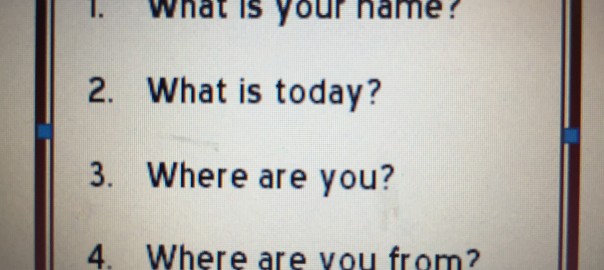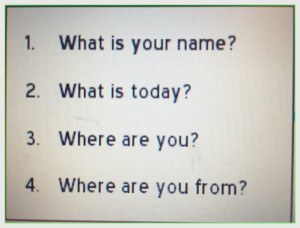Our relationship had become very rocky. Intimate moments between mother and child had been replaced wi th tension and conflict. I went to sleep every night and woke up every morning praying for answers. My heart longed for our previous normal.
th tension and conflict. I went to sleep every night and woke up every morning praying for answers. My heart longed for our previous normal.
I didn’t expect the answer to come in a dream.
One night, I saw a big white sheet lowered in front of me. In the middle of it was a round black dot. It wasn’t very big, but drew immediate attention to its elf because of the sharp contrast with the white background.
elf because of the sharp contrast with the white background.
As I looked at that black dot, a voice asked, “What do you see?”
The answer was obvious, “A black dot.”
After a pause, I heard, “That’s how you see your daughter.”
At first, I was puzzled. It didn’t make sense, but it didn’t take me long to realize that she was precious in many ways, but all I saw was the black spot. I didn’t see the white sheet because my attention was intently focused on the black dot.
I was crushed. I felt like a failure as a mother. But since that time, I’ve realized how easy it is to get side-ways in a relationship because we see the black spot and fail to see the good in another person.
Most of the time, the good far outweighs the bad, but if our focus is on the black spot, the positive fades into oblivion. The relational tension is magnified and grows because the other person can sense the displeasure, causing them to become guarded and tense, maybe even oppositional. Consequently, the spot seems darker or larger.
And the relationship deteriorates. Rapidly, if unloving words are exchanged.
We all sin. None of us are clean white sheets–except that we are washed in the blood of the lamb. While we’re focusing on the dark spot in others, there’s probably one in us too.
Knowing that should help us be a little more forgiving when we are confronted by a dark spot in others. However, in order for that to help, we need to step back, search our own hearts (What about a judgmental spirit, if nothing else?) and look at the whole “sheet” of the other person, noting their good qualities.
If we relate to them as if to someone we love and enjoy, the negatives will often take care of themselves. That’s especially true if we are aware of our own sinful nature.
But sometimes the problems don’t take care of themselves. And maybe the concern for your loved is valid. What do you do then?
You enlist help. “Cast your burden on the Lord, and He shall sustain you; He shall never permit the righteous to be moved” (Ps. 55:22).
He will sustain you, and He can fix what we can’t. He is much more effective at changing hearts and minds than we are.
Furthermore, He tells us to “be anxious for nothing, but in everything by prayer and supplication, with thanksgiving, let your requests be made known to God; and the peace of God, which surpasses all understanding, will guard your hearts and minds through Christ Jesus (Phil. 4:6-7).
What we want is peace concerning the loved one, but we will be anxious as long as we focus on the black spot. We find peace when we focus on the white, the good, and give the problem to God in prayer and supplication—and with thanksgiving.
Once again, it’s very difficult to be thankful when we’re focused on the black spot. It’s all right to glance at it, but our gaze needs to be on the Lord, on His power to redeem, His faithfulness, and on the positive things in our loved one.
If our thoughts and prayers are consumed with the problem, we’re making the problem worse. We need to learn to beware of black spots, because nothing is impossible with God (see Mt. 17:14-21).


 my days were dominated by migraines. Doctors couldn’t identify their source or find anything to help. Headaches ruled my life and greatly curtailed my productivity. For four months, I had only one full day and two half days when I was headache free and felt okay.
my days were dominated by migraines. Doctors couldn’t identify their source or find anything to help. Headaches ruled my life and greatly curtailed my productivity. For four months, I had only one full day and two half days when I was headache free and felt okay. sufficient?
sufficient?